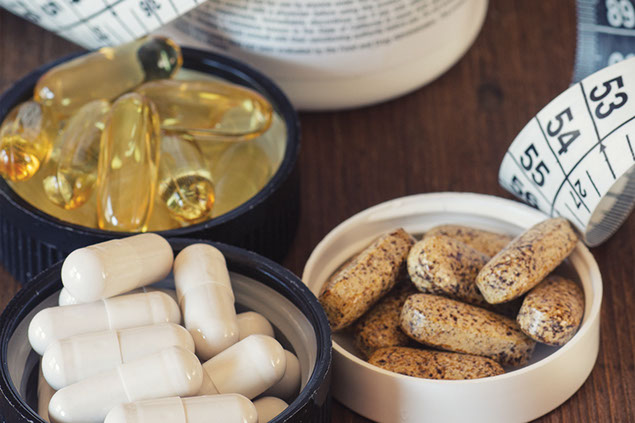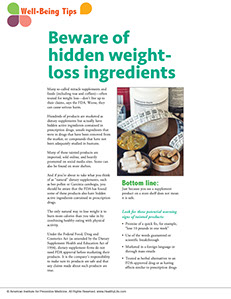SYMPTOM CHECKER
CONDITIONS
Male
Female
Child
Arm, Hand & Shoulder Concerns
Legs & Feet Concerns
Dental & Mouth Concerns
Ear & Nose
Eye Conditions
Head Conditions
Arm, Hand & Shoulder Concerns
Legs & Feet Concerns
Front
Back
Arm, Hand & Shoulder Concerns
Dental & Mouth Concerns
Ear & Nose
Eye Conditions
Head Conditions
Arm, Hand & Shoulder Concerns
Dental & Mouth Concerns
Ear & Nose
Eye Conditions
Head Conditions
Front
Back
Arm, Hand & Shoulder Concerns
Neck Links
Head & Neck Concerns
Arm, Hand & Shoulder Concerns
Neck Links
Head & Neck Concerns
Front
Back
Online Clinic
Wise Healthcare
Beware of hidden weight-loss ingredients
Print on Demand
Many so-called miracle supplements and foods (including teas and coffees)—often touted for weight loss—don’t live up to their claims, says the FDA. Worse, they can cause serious harm.
Hundreds of products are marketed as dietary supplements but actually have hidden active ingredients contained in prescription drugs, unsafe ingredients that were in drugs that have been removed from the market, or compounds that have not been adequately studied in humans.
Many of these tainted products are imported, sold online, and heavily promoted on social media sites. Some can also be found on store shelves.
And if you’re about to take what you think of as “natural” dietary supplements, such as bee pollen or Garcinia cambogia, you should be aware that the FDA has found some of these products also have hidden active ingredients contained in prescription drugs.
The only natural way to lose weight is to burn more calories than you take in by combining healthy eating with physical activity.
Under the Federal Food, Drug and Cosmetics Act (as amended by the Dietary Supplement Health and Education Act of 1994), dietary supplement firms do not need FDA approval before marketing their products. It is the company’s responsibility to make sure its products are safe and that any claims made about such products are true.
Bottom line:
Just because you see a supplement product on a store shelf does not mean it is safe.
Look for these potential warning signs of tainted products:
• Promise of a quick fix, for example, “lose 10 pounds in one week”
• Use of the words guaranteed or scientific breakthrough
• Marketed in a foreign language or through mass emails
• Touted as herbal alternatives to an FDA-approved drug or as having effects similar to prescription drugs
This website is not meant to substitute for expert medical advice or treatment. Follow your doctor’s or health care provider’s advice if it differs from what is given in this guide.
The American Institute for Preventive Medicine (AIPM) is not responsible for the availability or content of external sites, nor does AIPM endorse them. Also, it is the responsibility of the user to examine the copyright and licensing restrictions of external pages and to secure all necessary permission.
The content on this website is proprietary. You may not modify, copy, reproduce, republish, upload, post, transmit, or distribute, in any manner, the material on the website without the written permission of AIPM.
2021 © American Institute for Preventive Medicine - All Rights Reserved. Disclaimer | www.HealthyLife.com
















































